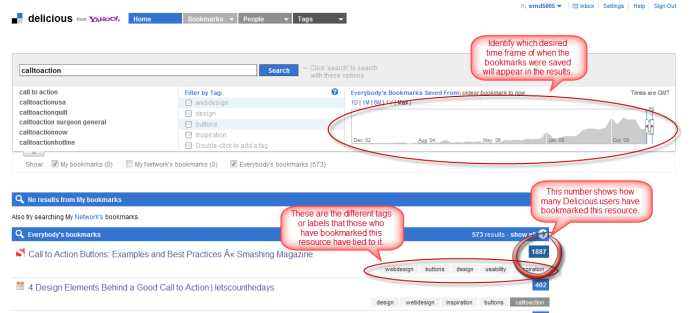In previous posts, An Alternative to Search Engines: Delicious, and An Alternative to Search Engines: Twitter, I discussed how today’s social media sites offer us an alternative to search engines when searching for information or resources. In those posts I also explained, in detail, how both Twitter and Delicious can be used for this purpose. StumbleUpon is also a site that can be used effectively for this purpose.
StumbleUpon
I like Stumbleupon because it’s more than just a social bookmarking site- it actually recommends pages to you based on your interests. There are times I have lost track of time while discovering numerous sites about e-marketing or other search terms. It has somewhat of an addictive nature to it.
Introduced in 2001, Stumbleupon is a “discovery engine” that uses your interests (determined by topics or tags you have said that you liked), and the pages you have already “liked” (or bookmarked using the thumbs up [ ] icon) or “disliked” (marked using the thumbs down [
] icon) or “disliked” (marked using the thumbs down [ ] icon) to find pages that you may find interesting. You can “discover” these sites by categories (i.e. “marketing”), by search term, and even by what your friends have liked. For more on how Stumbleupon works, see its about page.
] icon) to find pages that you may find interesting. You can “discover” these sites by categories (i.e. “marketing”), by search term, and even by what your friends have liked. For more on how Stumbleupon works, see its about page.
Use StumbleUpon for Search
Search from the StumbleUpon Website. There are a few different ways to use StumbleUpon to find resources. The first is to visit their web site and sign in. Once signed in, enter the keyword or tag in the “Search Favorites” box in the upper right hand corner.
 In this example, I’m using “photoshop tutorials.”
In this example, I’m using “photoshop tutorials.”
 You’ll see a page revealing results for the search terms from pages that only your friends liked.
You’ll see a page revealing results for the search terms from pages that only your friends liked.

To expand your search, choose “everyone’s favorites” from the drop down menu beside your search term and click search.

Now, your results will include all pages on StumbleUpon that match your search term. Notice how your search results have increased by over 30,000 results.

In order to find the best result, I generally use the number of views, the number of reviews associated with the page, and if any of my friends have liked the page. These aspects have been highlighted in the above picture for easy recognition. I try those with the most views and/or reviews first, until I find what I am looking for.
Search through the StumbleUpon Toolbar. Another way to use StumbleUpon to find resources is through its toolbar within Google (The StumbleUpon toolbar for different web browsers may differ than the one I am using here).
Beside the Stumble button, click “All.” A menu will appear with all of the categories you can stumble in. For example, stumbling in “Advertising” will allow you to only stumble through pages that were discovered and placed in the “Advertising” category. Choose “Search,” which will allow you to stumble through a query.

In the window that appears, type your search term and click okay to proceed.

You will see that you are automatically brought to a page that matches your search, as it has been tagged by others. Continue clicking the “stumble” button in the toolbar to stumble through more pages that match your search.
Other Posts in This Series: Delicious and Twitter
Other social media sites that can be used in a similar way to find some great resources include Delicious and Twitter. You can read about how I use Delicious to find resources in my post, An Alternative to Search Engines: Delicious, and discover how Twitter is used in a similar way in my post, An Alternative to Search Engines: Twitter.
Share Your Search Methods
How do you find your resources? Do you rely on search engines? Are there other social media sites that you use to find things? Please feel free to share your experiences and tips in the comments section.


